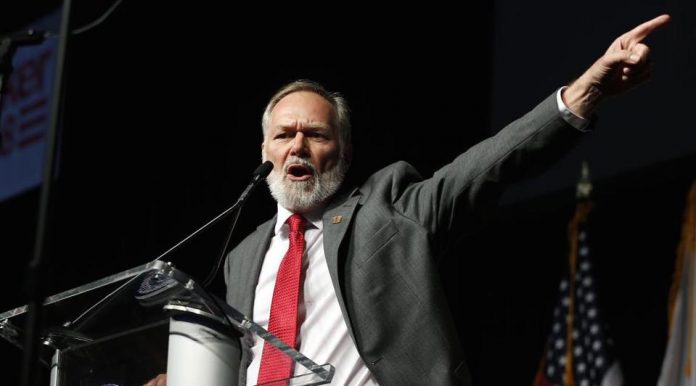
At last Saturday’s state Republican convention in Worcester, nearly 30 percent of GOP delegates backed the anti-LGBT activist pastor Scott Lively from Springfield, Massachusetts, in his primary run against Governor Charlie Baker, according to a May 1 Boston Globe report.
“Already Baker has said many of Lively’s views should have no place in public discourse. ‘I’m no fan of his position on gay rights, and I’ll just start there,’ he added Monday,” stated the Globe story, which went on to report on the federal lawsuit Lively faces for his work in Uganda aimed at depriving LGBT people of not only their basic human rights but in some cases life itself:
A judge last year called Lively’s efforts and writings against lesbian, gay, bisexual, transgender, and intersex people “odious” and “crackpot bigotry.”
“The question before the court is not whether Defendant’s actions in aiding and abetting efforts to demonize, intimidate, and injure LGBTI people in Uganda constitute violations of international law. They do,” wrote US District Judge Michael A. Ponsor. It’s a view Lively vociferously disputes.
The case — now pending before the US Court of Appeals in Boston — was publicly known before Saturday’s Republican convention but was not part of the public deliberations when nearly 30 percent of GOP delegates backed Lively over Governor Charlie Baker. Yet Lively’s opinions about gay people will likely be front and center during the primary campaign.
Lively was sued by Sexual Minorities Uganda, a gay rights organization but he won the first round of the Uganda case last year. The judge dismissed the lawsuit on jurisdictional grounds, but in an unusual legal twist, Lively is now appealing the ruling in his favor.
Given that Ponsor decided the court did not have jurisdiction over the matter, Lively argues, the judge did not have the authority to opine on the merit of the underlying allegation — that he aided and abetted a crime against humanity. …
The lawsuit, first filed in 2012, is drawing new attention after Lively won enough support — 28 percent of delegates — at the state GOP convention on Saturday to gain access to the Sept. 4 primary ballot. Lively says he is on track to submit the 10,000 signatures he needs to get to the secretary of state next month to be on the ballot.
Party insiders had expected Lively to fall short of garnering the 15 percent of delegates he needed to win ballot access.
But after a fiery speech in which Lively emphasized his conservative credentials and did not mention gay people — “I’m 100 percent pro-life. I’m 100 percent pro-Second Amendment. I stand on the original intent of the Constitution. I’m 100 percent pro-Trump” — he ended up getting the votes of 626 delegates.
After the balloting, several said they were animated by dismay over Baker’s moderate views rather than any positions held by Lively.
“This was: Delegates who are conservative are just fed up,” said Mary Lou Daxland, a delegate from Westport who voted for Lively and is president of the conservative Massachusetts Republican Assembly.
Daxland ticked through a multitude of complaints, from Baker’s opposition to many of President Trump’s policies to the governor’s decision to sign a transgender public accommodations bill into law in 2016.
“A lot of people feel: Why do we even have a Republican governor if he’s going to be pushing the Democrat agenda,” she said.
But Lively’s views on gay people are poised to be in the limelight.
In a sworn declaration made as part of the lawsuit in 2016, Lively makes what he sees an important distinction:
“I am joyfully compelled by Jesus Christ to love as individuals all persons who identify as homosexual or commit the sin of homosexuality,” he wrote. “However, I am strongly opposed to the gay agenda because I believe the agenda is a threat to the continuation of historically Judeo-Christian, marriage-based civilization as God designed and intended it for the benefit of mankind.”
Oral arguments for the appeal are scheduled to begin on June 7.








